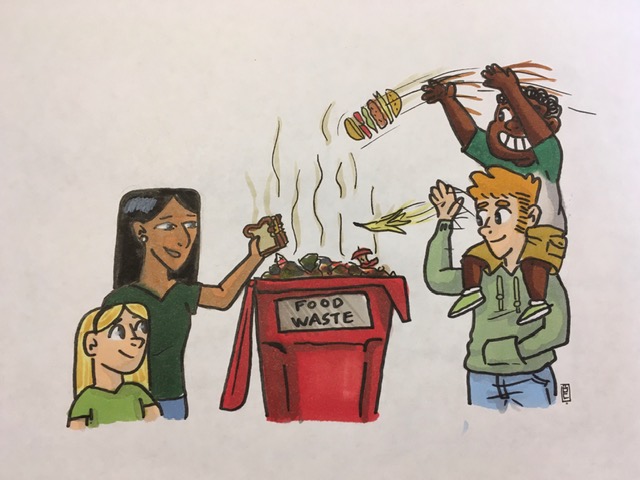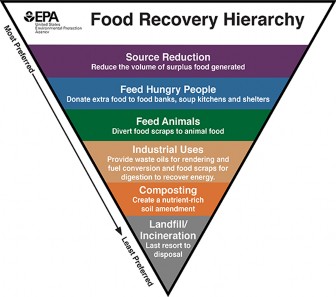
Phase Eight: Enhance
General Waste Reduction
The New Jersey Department of Environmental Protection website provides information about reducing waste.
Tools to Reduce Waste in Schools is a guide developed by the United States Environmental Protection Agency (USEPA) in February 2007. “This guide provides schools, school districts, and school business officials with audience-specific information for starting or expanding an existing waste reduction program.” as described in its introduction.
Buy Recycled
NJDEP Green Purchasing: A Guide for Local Governments and Communities, February 2006
Food Waste
According to Savethefood.com, 40% of all food in America is wasted. The US Environmental Protection Agency (EPA) has created the Food Recovery Hierarchy below “to prioritize actions organizations can take to prevent and divert wasted food”.
USDA, EPA and University of Arkansas Guide to Conducting Student Food Waste Audits
In November, 2017 the USDA, EPA, and University of Arkansas, published the Guide to Conducting Student Food Waste Audits: A Resource for Schools. To quote the purpose of the guide:
“On September 16, 2015, the U.S. Department of Agriculture (USDA) and U.S. Environmental Protection Agency (EPA) announced the United States’ first-ever national food waste reduction goal, calling for a 50% reduction by 2030 (USDA News Release No. 0257.15). In our food system, there are many points at which food loss and waste are generated, including in schools and households (Buzby and Guthrie and Buzby et al.). This student food waste audit guide is intended to help educate students about the amount of food they waste in their school cafeterias and to encourage them to reduce waste and eat more of the nutritious foods provided through USDA’s school meals programs or brought from home.”
NJDEP School Food Waste Guidelines K-12 Edition
In November 2019, the New Jersey Department of Environmental Protection issued School Food Waste Guidelines K-12 Edition. “These School Food Waste Guidelines are meant to advise K-12 schools and higher education institutions on how they can effectively reduce, recover, and recycle food waste. The guidelines use the EPA Food Recovery Hierarchy to illustrate how to prioritize actions schools can take to prevent and divert wasted food.”
Save the Food
Forty percent of all food in America is wasted. Visit savethefood.com to learn how to avoid wasting food. They offer a Partner Kit with promotional materials, such as the posters below, to get the word out and educate.
 |
 |
 |
 |
ReFED
“ReFED is a multi-stakeholder nonprofit, powered by an influential network of the nation’s leading business, nonprofit, foundation, and government leaders committed to reducing U.S. food waste. ReFED takes a data-driven approach to move the food system from acting on instinct to insights to solve our national food waste problem. Solutions already exist to cut food waste by 20% nationwide. ReFED has identified 27 of the best opportunities through the Roadmap to Reduce U.S. Food Waste, a first-of-its-kind economic analysis, making it easier for stakeholders across the food supply chain to meet the national 50% reduction goal by 2030.”
Sustainable Jersey for Schools – Food Waste Management Action
If you are participating in the Sustainable Jersey for Schools program, consider completing the Food Waste Management Action (under Waste Management & Recycling) to earn 15 points.
On-site Composting
The Rocket Composter
Food Waste Experts, formerly Nath Sustainable Solutions, provides various solutions to food waste, one of which is the Rocket Composter. Below is a list of 11 locations in New Jersey that have a Rocket Composter on site, most of which are schools, colleges, and universities. The model of the Rocket Composter at each site is listed in parentheses after the name of each site. While the unit is expensive, you may be able to obtain grant funding to purchase one.
Schools:
- Chatham High School, Chatham (A500)
- First Rocket Composter in New Jersey at Chatham High School (article in the Patch, April 14, 2011)
- Chatham High School implements 3-bin waste stations in Cougar Cafe (article in the Independent Press on nj.com updated March 29, 2019)
- Gill St. Bernard’s School, Gladstone (A500)
- Kingsway Regional School District, Woolwich Township (A500)
- Secaucus School District, Secaucus (A500)
- Weequahic High School, Newark (A500)
Colleges/Universities:
- Bergen Community College, Paramus (A900) – Watch this video
Diverting food waste from the trash into The Rocket Composter, on-site, at Bergen Community College
- Montclair State University, Montclair (A900)
- Ramapo College of New Jersey, Mahwah (A700)
Other:
- Duke Farms, Hillsborough (A700)
- Merck I, Kenilworth (A900)
- Merck II, Rahway (A900)
Other On-site Composting Resources
Institute for Local Self-Reliance published the Guide to Composting Onsite at Schools in October 2018.
Two companion guides from the Northeast Recycling Council (NERC):
Paper – Composting School Food Scraps and Soiled Paper, 2011
Presentation – School Composting Options, 2011
Off-Site Composting
Very limited options exist in New Jersey for off-site composting facilities to which a school could have its compostable food waste delivered. A new Food Waste Recycling Act was passed in New Jersey in April 2020 and is expected to spur the growth of food waste recycling facilities. The new law mandates that by October 2021, large generators (those which generate more than 52 tons of food waste per year) recycle their food waste if there is a facility that is available to accept the material. This may impact some school districts.
DeMasi Schools in Marlton, NJ, and Organic Diversion, LLC – Video Series
- Composting Program and Community Garden Yields Healthy Food
Composting, Community Garden, Milk Weed for Butterflies, Kids Educating Kids (with Irene Romaneli, Principal of DeMasi Schools).
- Grant Enables Start of an Organic Garden using their own compost at an Elementary School
Starting/planning an organic garden at an elementary school with a grant and using their own compost (with Maria Kreslow, Teacher and School Garden Coordinator at DeMasi Schools) The DeMasi Schools received a grant from the wholekidsfoundation.org to start their organic garden.
- Monarch Butterfly program and use of compost in milkweed beds
Monarch Butterfly tagging and sampling program along with using compost in the milkweed bed (with Gwenn Egan, Teacher at DeMasi Schools). Note: While the organization mentioned and displayed in the video, EIRC.org, may no longer exist to access the Monarch Teacher Network, there’s a Facebook group for the Monarch Teacher Network.
- Ideas for Promoting Recycling and Composting
Daily “Trash Talk” announcements give tips and Earth Day ideas (with Susanne Gagnon, Teacher at DeMasi Schools).
- Food waste composting at a School with Organic Diversion, LLC
Food waste from DeMasi school is sent to Organic Diversion and finished compost is brought back. (with Tom Donahue, Operations Manager at DeMasi Schools).
- Organic Diversion, LLC, of Marlton, NJ provides food waste composting services
Organic Diversion, located in Marlton, NJ, provides complete food waste composting services to schools and other entities in Burlington, Camden, and Mercer counties and in Philadelphia (with Gail Rosati of Organic Diversion, LLC).

